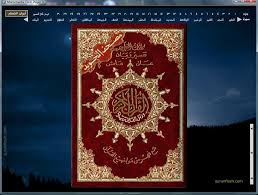this week my task is to memorize the surah in my quran class.
find a good article on it here.
Surah Al-A'la = The Most High
Number of Surah (chapter) = 87
Number of Ayah (verses)= 19
Place of revelation = Makkah
The Surah taken its name from the word Al-A'la in its first verse.
This Surah was revealed in Makkah before the migration to Al-Madinah. The proof of this is what Al-Bukhari recorded from Al-Bara' bin `Azib, that he said, "The first people to come to us (in Al-Madinah) from the Companions of the Prophet were Mus`ab bin `Umayr and Ibn Umm Maktum, who taught us the Qur'an; then `Ammar, Bilal and Sa`d came. Then `Umar bin Al-Khattab came with a group of twenty people, after which the Prophet came. I have not seen the people of Al-Madinah happier with anything more than their happiness with his coming (to Al-Madinah). This was reached to such an extent that I saw the children and little ones saying, `This is the Messenger of Allah who has come.' Thus, he came, but he did not come until after I had already recited (i.e., learned how to recite)(Glorify the Name of your Lord, the Most High.) (87:1) as well as other Surahs similar to it.'' It has been confirmed in the Two Sahihs that the Messenger of Allah said to Mu`adh, (Why didn't you recite "Glorify the Name of your Lord, the Most High,''; "By the sun and its brightness,'' and "By the night when it envelopes.'')
Imam Ahmad recorded from An-Nu`man bin Bashir that the Messenger of Allah recited Surat Al-A`la (chapter 87) and Surat Al-Ghashiyh (chapter 88) in the two `Id prayers. If the `Id prayer fell on Friday, he would recite them in both prayers (`Id and Salat Al-Jumu`ah).
Muslim also recorded this in his Sahih, as well as Abu Dawud, At-Tirmidhi, An-Nasa'i and Ibn Majah. The wording of Muslim and the Sunan compilers says, "He used to recite Surat Al-A`la (chapter 87) and Surat Al-Ghashiyh (chapter 88) for the two `Ids and Jumu`ah. If they occurred on the same day, he would recite them in both of them.''
The meaning of the Surah are:
* verse 1: The Command to pronounce Tasbih and its Response
سَبِّحِ اسْمَ رَبِّكَ الاّعْلَى
o 1. Exalt the name of your Lord, the Most High,
Allah Almighty should be remembered only by the beautiful names which suit and befit Him.
* Verses 2-5: The Creation, the Decree, and the bringing forth of Vegetation
o الَّذِى خَلَقَ فَسَوَّى
2. Who created and proportioned;
o وَالَّذِى قَدَّرَ فَهَدَى
3. And who destined and then guided;
o وَالَّذِى أَخْرَجَ الْمَرْعَى
4. And who brings out the (green and luscious) pasture,
o فَجَعَلَهُ غُثَآء أَحْوَى
5. And then make it black stubble.
"Your Lord, glorification of Whose name is being enjoined, is He Who created everything in the Universe, proportioned it, set it a destiny, taught it to perform the function for which it is created, and you witness this manifestation of His power day and night that He creates vegetation on the earth as well as reduces it to mere rubbish. No other being has the power to bring about spring nor the power to prevent autumn."
* Verses 6-8: The Prophet does not forget the Revelation
o سَنُقْرِئُكَ فَلاَ تَنسَى
6. We will make you recite, O Muhammad, and you will not forget,
o إِلاَّ مَا شَآء اللَّهُ إِنَّهُ يَعْلَمُ الْجَهْرَ وَمَا يَخْفَى
7. Except what Allah should will. Indeed, He knows what is declared and what is hidden.
o وَنُيَسِّرُكَ لِلْيُسْرَى
8. And We will make it easy for thee (to follow) the simple (Path).
This is Allah informing and promising him (the Prophet ) that He will teach him a recitation that he will not forget.(Except what Allah may will.)
* Verses 9-13: The Command to remind
o فَذَكّرْ إِن نَّفَعَتِ الذّكْرَى
9. So remind, if the reminder should benefit;
o سَيَذَّكَّرُ مَن يَخْشَى
10. He who fears Allah will be reminded.
o وَيَتَجَنَّبُهَا الاْشْقَى
11. But it will be avoided by those most unfortunate ones,
o الَّذِى يَصْلَى النَّارَ الْكُبْرَى
12. He who will enter and burn in the greatest Fire,
o ثُمَّ لاَ يَمُوتُ فِيهَا وَلاَ يَحْيَا
13. In which they will then neither die nor live.
Allah then says,(Therefore remind in case the reminder profits.) meaning, remind where reminding is beneficial. From here we get the etiquette of spreading knowledge, that it should not be wasted upon those who are not suitable or worthy of it. The Commander of the believers, `Ali said, "You do not tell people any statement that their intellects do not grasp except that it will be a Fitnah (trial) for some of them.'' He also said, "Tell people that which they know. Would you like for Allah and His Messenger to be rejected''
Would you like for Allah and His Messenger to be rejected'' Allah said:
(The reminder will be received by him who fears,) meaning, `he whose heart fears Allah and who knows that he is going to meet Him, will receive admonition from what you convey to him, O Muhammad.'
Imam Ahmad recorded from Abu Sa`id that the Messenger of Allah said,
Concerning the people of the Fire who are deserving of it, they will not die nor will they live. Regarding the people that Allah wants mercy for, He will cause them to die in the Fire. Then He will allow the intercessors to come to them, and a man will take his groups of supporters and plant them (or he said (they will be planted) in the River of Al-Haya (or he said (Al-Hayah, or Al-Hayawan, or Nahr Al-Jannah). Then they will sprout up like the sprouting of the seed on the moist bank of a flowing stream.)
Then the Prophet said,(Haven't you all seen the tree that is green, then it turns yellow, then it turns green (again)) Abu Sa`id then said that some of those present said, "It is as if the Prophet used to live in the desert wilderness (i.e., due to his parables of nature).''
Ahmad also recorded from Abu Sa`id that the Messenger of Allah said,(Concerning the people of the Fire who will be dwellers of it, they will not die in it nor will they live. However, there will be a group of people - or as he said -( whom the Fire will burn due to their sins - or he said - (their wrongdoings. So, He will cause them to die until they become burnt coal. Then the intercession will be allowed and they will be brought group after group, and they will be scattered over the rivers of Paradise. Then it will be said: "O people of Paradise! Pour down upon them.'' Then they will sprout like the growing of the seed that is upon the moist bank of the flowing stream.'' Then, a man from among the people present said, "It is as if the Messenger of Allah used to live in the desert wilderness.'' Muslim also recorded this Hadith.
* Verses 14-15: A Statement concerning the People of Success
o قَدْ أَفْلَحَ مَن تَزَكَّى
14. But those will succeeded who purify themselves,
o وَذَكَرَ اسْمَ رَبِّهِ فَصَلَّى
15. And glorify the name of Allah, and (lift their hearts) in prayer.
Allah says,(Indeed whosoever purifies himself shall achieve success.) meaning, he purifies himself from despised characteristics and he follows what Allah has revealed to the Messenger .
(And remembers the Name of his Lord, and performs Salah.) meaning, he establishes the prayer in its appointed time, seeking the pleasure of Allah, obedience to His command, and implementation of His Law.
* Verses 16-17: This World is Worthless in Comparison to the Hereafter
o بَلْ تُؤْثِرُونَ الْحَيَوةَ الدُّنْيَا
16. But you prefer the worldly life,
o وَالاٌّخِرَةُ خَيْرٌ وَأَبْقَى
17. But the Hereafter is better and more enduring.
The reward of the final abode is better than the worldly life, and it is more lasting. For indeed, this worldly life is lowly and temporal, whereas the Hereafter is noble and eternal. Thus, how can an intelligent person prefer that which is short-lived over that which is eternal. How can he give importance to that which will soon pass away from him, while ignoring the importance of the abode of eternity and infinity.
* Verses 18-19: The Scriptures of Ibrahim and Musa
o إِنَّ هَـذَا لَفِى الصُّحُفِ الاٍّولَى
18. Indeed, this is in the former Books (Revelation),-
o صُحُفِ إِبْرَهِيمَ وَمُوسَى
19. The Books of Abraham and Moses.
Verily, this is in the former Scriptures -- the Scriptures of Ibrahim and Musa.) This Ayah is similar to Allah's statement in Surat An-Najm,(Or is he not informed with what is in the Scriptures of Musa. And of Ibrahim who fulfilled (or conveyed) all that (Allah ordered him to do or convey): that no burdened person (with sins) shall bear the burden (sins) of another. And that man can have nothing but what he does. And that his deeds will be seen. Then he will be recompensed with a full and the best recompense. And that to your Lord is the End (Return of everything).) (53:36-42) And so forth, until the end of these Ayat.
===================
Activities and worksheets for kids:
o Memorize the surah.
o Write surah Al-A'la in Arabic.
o Write the meaning, translation surah Al-A'la.
o Write the paragraph.
o Learn how to perform salah.
+ Step-by-Step Guide to Prayer 1/7 (Intro & Wudu)
+ Step-by-Step Guide to Prayer 2/7 (Reminders)
+ Step-by-Step Guide to Prayer 3/7 (Fajr)
+ Step-by-Step Guide to Prayer 4/7 (Dhur)
+ Step-by-Step Guide to Prayer 5/7 (Asr)
+ Step-by-Step Guide to Prayer 6/7 (Maghreb)
+ Step-by-Step Guide to Prayer 7/7 (Isha)-(END)-REUPLOADED
+ How to perform salat(prayer)
o You can read Benefits of Prayer and Calmness (Khushu) in Salah
o
o Learn and memorizes Asma ul-Husna (99 Names of Allah)
+ Listen to Asma-Ul-Husna(Exclusive)
+ Listen to Asma-Ul-Husna/99 Names of Allah
+ Listen to 99 Names of Allah
+ Listen to the beautiful 99 Names of Allah
+ Listen to Asma ul-Husna
+ List of Asma-Ul-Husna
=====================
Let's hear surah Al-A'la and memorize it:
o Sheikh Mishary Rashed Alafasy - Sura A`la
o Surah Al-A'la [Sh.Nabil Ar-Rifa'i]
o Surah A'la (Mishary Rasheed al Efasy)
o Mishary Rashid Al Afasi- Surah Al A'la ( Learning Version)
o Salah Bukhatir-Surah Al-Ala (87)
o Surah Al-A'la-Saad Al Ghamidi
o Surah Al-A'la
o Quran: Surah Al-A'la, Qari Antar, Quran
o Surah Al-A'la
o Quran Chapter 87 - Sūrat Al-A`lā(The Most High)
o Surah Al-A'la
o Tafsir Al-Quran in Malay (Surat Al-A'laa)
Listen to tafsir Surah Al-A'la:
o Ayah 1
o Ayah 2
o Ayah 3
o Ayah 4
o Ayah 5
o Ayah 6
o Ayah 7
o Ayah 8
o Ayah 9
o Ayah 10
o Ayah 11
o Ayah 12
o Ayah 13
o Ayah 14
o Ayah 15
o Ayah 16
o Ayah 17
o Ayah 18
o Ayah 19
Here are other links:
o MP3 Qur'an
o Transliteration Qur'an
o Tafsir Ibn Kathir
Sources:
o Tafsir Ibn Kathir
Hajiku 1435H / 2014, Insya-Allah
11 years ago










